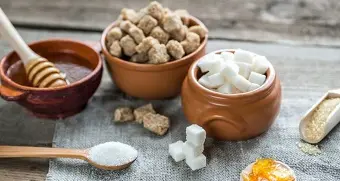Sugar Alternatives: A Comprehensive Guide to Healthy Sweeteners
11 Apr 2023 • by Natalie Aster

As people become more health conscious and aware of the adverse effects of sugar consumption, many are turning to sugar alternatives to satisfy their sweet cravings. With so many options available, it can be difficult to know which ones are the best for your health and taste buds. In this comprehensive guide, we’ll explore the various types of sugar alternatives, their benefits and drawbacks, and how to use them in your daily life.
What are Sugar Alternatives?
Sugar alternatives, also known as sweeteners or sugar substitutes, are substances used instead of table sugar (sucrose) to sweeten foods and drinks. They can be natural or artificial, and are often used in products marketed as “low-sugar” or “sugar-free”.
Natural Sugar Alternatives
Natural sugar alternatives are derived from plants, fruits, or other natural sources, and are minimally processed. They are generally considered a healthier option than artificial sweeteners, as they contain fewer calories and may provide additional health benefits.
Stevia
Stevia is one of the most popular natural sweeteners. It is produced from the leaves of the Stevia rebaudiana plant, indigenous to South America. It has become increasingly popular in recent years as a natural alternative to sugar, as it is up to 200 times sweeter than sugar and at the same time contains no calories. Stevia is available in both liquid and powdered forms and can be used in baking and cooking.
Honey
Honey is another common natural sweetener produced by bees from the nectar of flowers. It contains antioxidants and has antibacterial properties, therefore, it is recognized as a healthier alternative to sugar. Nevertheless, it is still high in calories and should be consumed in limited amounts. Honey can be used in baking, cooking, and as a topping for foods, for instance, oatmeal or yogurt.
Maple Syrup
Maple syrup is a natural sweetener high in antioxidants and minerals like manganese and zinc, therefore, it is widely adopted as a healthier substitute for sugar. It is produced from the sap of maple trees. However, it is still high in calories and should be consumed with caution. Maple syrup is commonly used in cooking, baking, and as a food topping, for example, with pancakes or waffles.
Artificial Sugar Alternatives
Artificial sugar alternatives are synthetic compounds created in a laboratory. They are often used in diet and low-calorie products and are generally sweeter than natural sweeteners.
Aspartame
Aspartame is an artificial sweetener commonly used in diet soft drinks and many other low-calorie products. It is up to 200 times sweeter than sugar and at the same time contains no calories. However, it is controversial due to its potential health effects and should be consumed in moderation.
Sucralose
Sucralose is an artificial sweetener widely adopted in the production of low-calorie food products and beverages. It is up to 600 times sweeter than sugar, but calorie-free. However, it may have certain negative effects on gut health and should be consumed in small amounts.
Benefits of Sugar Alternatives
Using sugar alternatives instead of table sugar can have a number of benefits for your health, including:
- Reduced calorie intake: Sugar alternatives are often lower in calories than regular sugar, therefore, it is a great option for those looking to lose weight or lower their calorie intake.
- Better blood glucose control: Sugar alternatives often have a lower glycemic index in comparison to table sugar, thus they cause a slower and more steady rise in blood glucose levels.
- Lower risks of tooth decay: Sugar alternatives do not promote tooth decay like regular sugar does, thereby making them a great option for those concerned about their dental health.
- Additional health benefits: Some sugar alternatives (for instance, maple syrup and honey) contain antioxidants and different other beneficial compounds that can improve your overall health.
Drawbacks of Sugar Alternatives
Whilst sugar alternatives can be a healthier option compared with regular sugar in many cases, they are not without their drawbacks. Here are some potential drawbacks to be aware of:
- Artificial sweeteners may have negative health effects: Some artificial sweeteners (for instance aspartame and sucralose) are associated with negative health effects like headaches and digestive issues.
- Natural sweeteners may still have a high calorific value: Although some natural sugar alternatives like maple syrup and honey are considered to be healthier than sugar, they are still very high in calories.
- Some sugar alternatives may have a strong aftertaste: Some sugar alternatives (for instance, monk fruit and stevia) may have a strong aftertaste that can be off-putting to some people.
Conclusion
In conclusion, sugar alternatives can be a nice option for those who want to cut down sugar consumption as well as improve their overall health. Natural sweeteners can also provide additional health benefits, while certain artificial sweeteners may have negative health effects. To sum up: when using sugar alternatives, it is essential to control the amount consumed and take into consideration potential drawbacks.
Find many topical research studies covering the sugar alternatives market available at MarketPublishers.com using our search form.
CONTACTS
The Market Publishers, Ltd.
Natalie Aster
Tel: +357 96 030922
[email protected]
MarketPublishers.com
Analytics & News
